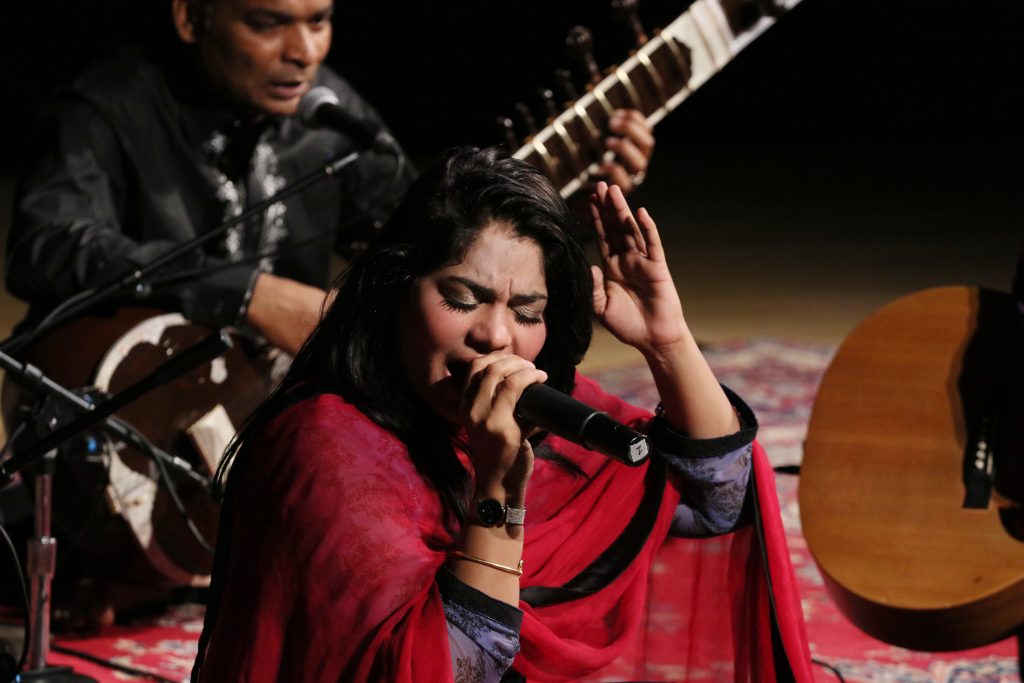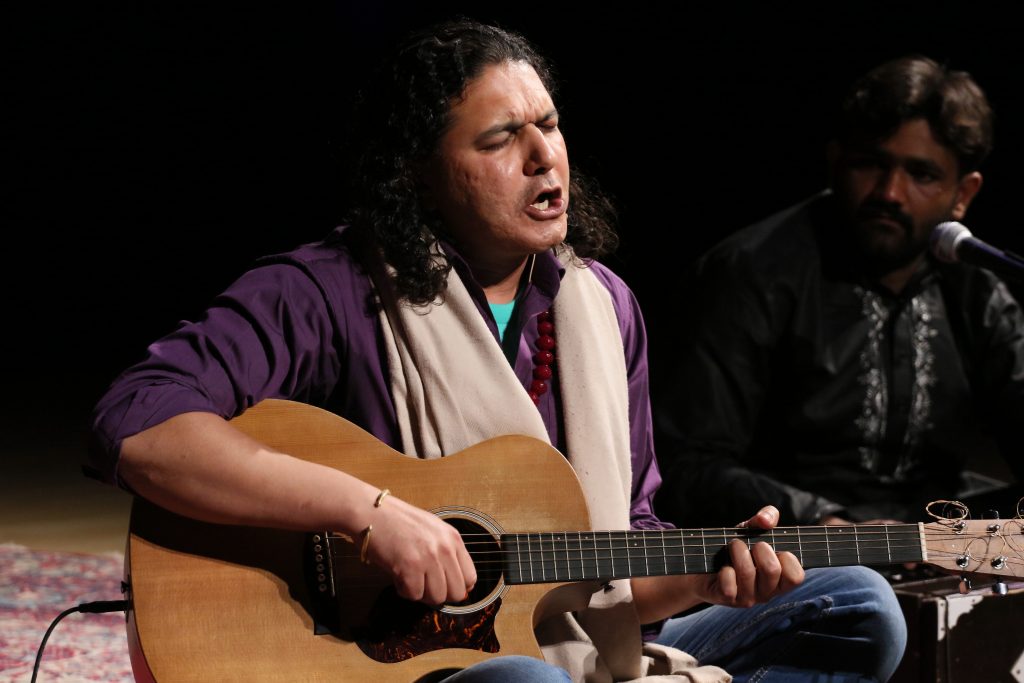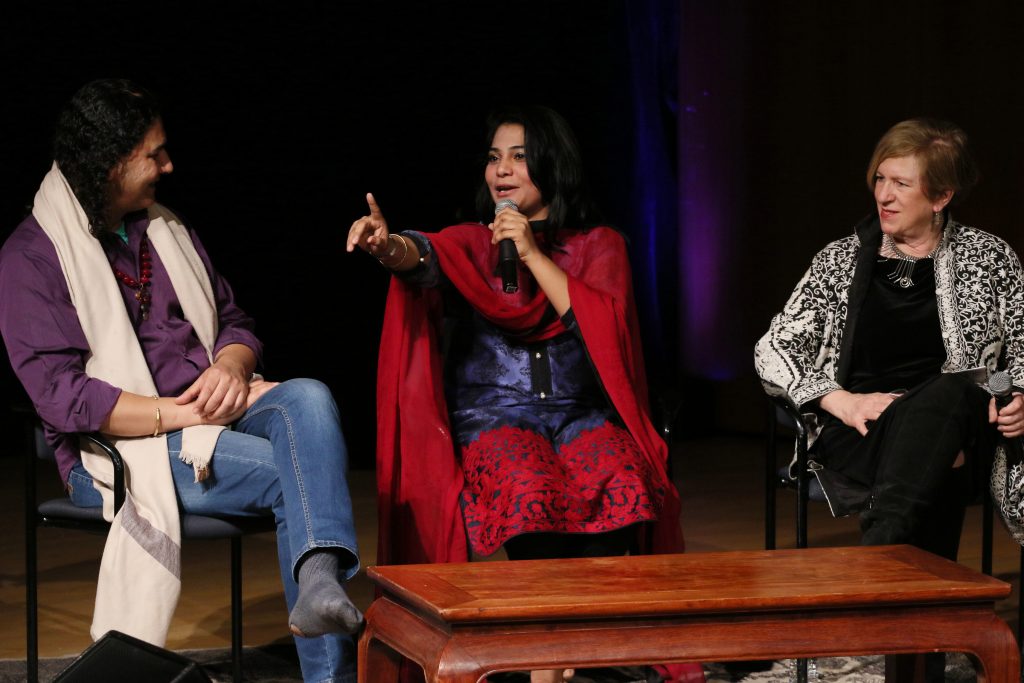On a warm April evening in New York, a Pakistani woman holds an audience captive at the Asia Society in the Upper East Side. Sitting cross-legged and barefoot on a red Persian rug, she leads a sama (an experiential Sufi ceremony celebrating God) accompanied by four male musicians playing the tabla, harmonium, sitar and dholak.
The woman, Sanam Marvi, wears a black, red and gray shalwar kameez with a translucent red chiffon scarf draped across her body. Her loose medium-length black hair frames her face. Her only adornments are a silver watch, a gold bracelet, small studded hoop earrings and her voice — a rich, deep belting voice that ricochets off the walls of the small auditorium and pierces New York reserve. Some audience members sway; some shout out praise and/or comments. The majority clap loudly in time with the music. The five songs she sings bookend a three-way question-and-answer session about Sufi music, led by Rachel Cooper, a director at the Asia Society. Fellow performer Arieb Azhar fluidly translates Cooper’s questions from English to Urdu, and Marvi’s response from Urdu into English.
Marvi’s answers are short and unembellished, in direct contrast to the rich imagery of the songs she passionately sings, which meditate on the longing for God and praise Allah, Prophet Muhammad and others. Such poems include Ghoom Charkhia Ghoom (Spin, Spinning Wheel) by Shah Hussain, in which the poet declares, “My body is You, my soul is You. My inner heart is You, my spirit and life is You.”
A Sufi tradition
Marvi’s repertoire draws on a long history of Sufi verse and music in the Indian subcontinent dating from the 13th century. It was during the Delhi Sultanate that “ecstatic” Sufi practices became popular and were the reason many people converted to Islam. Such practices became a key feature of religious ceremonies at shrines and dergahs where even today, they continue to draw people from all religious backgrounds.The primary themes of religious love and devotion in Sufi poetry can be understood purely at a secular level — in the same way the poetry of Sufi mystic Jalal’uddin Rumi can. Poems with seemingly hedonistic themes, such as getting drunk and frequenting taverns, are implicitly spiritual. It is perhaps because of Sufi music’s appeal to both religious and secular audiences that it has become popular in and beyond South Asia.
One of the most well-known genres of Sufi music from Pakistan, India and Afghanistan is qawwali. The term refers to someone (qawwal) who repeats or sings an utterance of the prophet (qaul). Sufi saint Amir Khusrau of Delhi is credited with creating qawwali music through integrating Arabic, Indian, Persian and Turkish music traditions. Qawwali music is structured in a particular way to generate an experiential effect on the listener. The music starts off gently and then builds into a passionate climax. Thus, purely on a sonic level, a listener can be moved to intense emotional highs. Many listeners will also be incited to clap, sway and/or dance.

Sanam Marvi
Although qawwali may the best-known type of South Asian Sufi music in the West, there are many different types. For example, a manquabat is a song in praise of Imam Ali or a Sufi saint; a ghazal is a love song that may talk about the agony of separation from the beloved and sounds secular at face value; while a kafi is a poem in Punjabi, Siraiki or Sindhi — a style employed by celebrated poets such as Bulleh Shah and Sachal Sarmast, whose work Marvi draws upon extensively in her performances.
‘A conversation with God’
When I sat down with her and Azhar the next afternoon at the Brooklyn Academy of Music (BAM) in Brooklyn, she admits that she has a special relationship with the work of Sachal Sarmast, a poet from Marvi’s province of Sindh. Dressed in a white and pale green cotton kameez and tapered white trousers with a black and brown shawl thrown over one shoulder, her unmade face appears much younger than her 31 years.
“I see all the poets as the same as they all have the same message, but I do have a special connection with Sachal Sarmast. He wrote in Siraiki,” Marvi says, referring to the dialect spoken in the Punjab province. Consequently, her favorite time to perform is at Sarmast’s urs, an event that commemorates the anniversary of the death of revered saints and poets, as well as the urs of Shah Abdullah Latif Bhittai, a Sindhi poet and saint.
She describes the experience of performing as “having a conversation with God.” “I always feel I am turned to God. I always feel I have a connection to God. It feels like He’s in front of me. It feels that I’m having a conversation with God when I sing.”
Marvi grew up in the city of Hyderabad in Sindh and is one of a handful of famous female Sufi singers and a household name in Pakistan. Her road to success has been a lifelong journey. She admits it was a path she knew she wanted to traverse from a young age.
“I started singing when I was 7 years old, but my interest started when I was 4 or 5 when I heard my father singing and the children he taught sing. I was about 5 or 6 when I watched TV for the first time at a wealthy neighbor’s house — we were too poor to own a TV — and I heard Abida Parveen’s song Tere Ishq Nachaya. I remember thinking, I want to sing like Abida. My dad said that this is not possible right now, but let’s see when you get bigger. I said to mum, ‘I want to do this.’ I went to bed, and the next day, I said, ‘I want to do this. I want to do this.’ My dad said, ‘OK, if you want to do this, you have to do it really well.’ ”
She took his words seriously and worked diligently to perfect the craft. In 2009, when she was 23, she appeared on PTV’s music program Virsa Heritage. She was then invited to appear on the music series Coke Studio in 2010, which gained her international recognition. Since then, she has performed around the world, including the Fes Festival of World Sacred Music in Morocco. Her recent three-and-a-half-week tour of the U.S. came via Center Stage, an organization that aims to introduce diverse international artists to American audiences. She says she was excited by the invitation as it allows her to share Sufism with different audiences. “My message for humanity is that we are all created by the same God and we are one people. Nobody’s Muslim, Hindu or Christian; we are all one.”
Attacks on Sufi music
This inclusive message is threatening to those who seek to use religion as a divisive tool, not least in Pakistan where celebrated Sufi singer Amjad Sabri was killed by the Pakistani Taliban in June. His father, Ghulam Farid Sabri, was one half of the internationally renowned duo the Sabri Brothers. Moreover, in February, 88 people were killed in a terrorist attack at the shrine of Sufi saint Lal Shahbaz Qalandar in Sehwan, Sindh. The saint is commemorated in the popular song O Laal Meri Patt (also known as Dama Dam Mast Qalander), a song that Marvi performs as her finale on both nights in New York.
When I ask if she is worried about her personal safety, she says, “When I do big concerts, I’m really afraid something could happen. Artists need better security in our country. We couldn’t even imagine something like this would happen at the shrine of Lal Shahbaz Qalandar. I’m afraid, but I’ve never had any threats.”

Arieb Azhar
When I ask why Sufism is under threat in Pakistan, Marvi says that some people think Sufis are committing shirk (idolatry). Arieb Azhar also adds, “A wheel has different spokes. The closer you are to your path, the closer the other spokes are. The closer you are to God, the more you see God in everything. The further you are from your own center, the further everyone else seems to be. You say, kafr (disbeliever), shirk. Extremists are not connected to their own religion, or people on their own path.”
The road ahead
Marvi says her future plans depend on whether people continue to support what she does. “I want to continue to learn, and particularly tackle any mistakes in my work. Ultimately if life gives me the opportunity, I want to become better at what I do. I have plans to teach, but at the moment, I want to support my father and other teachers. I myself have not learned everything I need to do to teach others. I am still learning. I’m always learning.”
Her role models are Abida Parveen and her father, Faqeer Ghulam Rasool, whom she credits with her success. “My father always said, ‘You can do this. The others [my brothers] can’t do this. But you can do this.’ I learned a lot from my father. He taught me that this is a man’s field, and how to go through life as a female musician. He taught me to face things like a man as you are always in this field with men.”
He also taught her to be consistent and dedicated with her practice. “My father said if you leave this work for a day, this work will leave you for a week. If you leave this work for a week, it will leave you for a month, so don’t leave it.” Unsurprisingly, she has a tight bond with her father, whom she describes as “her best friend. We chat, we fight, we make up. He phones me daily.”
How does she deal with criticism? “I’m always glad when someone gives me criticism. One is apt to think highly of oneself — ‘I’m doing great work, I am the best.’ When someone says I’ve made a mistake, I consider it. My father says, ‘When someone praises you, listen, and when someone gives you feedback, listen.’ My father does the same.”
Along with doing vocal training for two hours a day, Marvi also manages a full schedule as a wife and mother to four children under 10. “I manage it — the children, school and everything else. If I have time, I take the children to school and give them tuition. You have to make time for everything — for family, husbands, friends.”
Branching out
She has also found time to contribute music to rom coms London, Paris, New York (2012), Ishq Khuda (Love is God), and numerous television series, despite once expressing a “mild disdain for popular music,” according to BAM’s program notes. Her forays into the film and television industries are in line with a trend that has seen the increasing popularity and commercialization of South Asian Sufi music. Pakistani Sufi musician Nusrat Fateh Ali Khan paved the way: He became internationally renowned after signing with the Real World label, collaborating with British singer Peter Gabriel, and performing live at World of Music, Arts and Dance festivals.
Such commercialization is not without its critics, who believe the spiritual and commercial are at odds with one another. Indian Sufi singer, lyricist and composer Madangopal Singh — in an interview with The Hindu newspaper — said that Sufi music was “getting aggressively appropriated by inhabitants of lifestyle pages.” He goes on to say that singers will sing Sufi songs anywhere as long as they’re paid for it, and this violates the Sufi spirit.
Others, in the main, disagree. Pakistani poet, writer and filmmaker Mumtaz Hussain — who is based in New York — does not think that commodification of Sufi music dilutes the message. He said, “The core of the message remains. Whether the music is performed at the mosque or in the red light area, the core remains. When your message reaches the masses, you can call it commercialization, but I think it’s just reaching a wider audience. Around 15 years ago, Nusrat Fateh Ali Khan performed in Central Park. About 60,000 to 70,000 people came. It wasn’t a commercial venture. It was free. In such ways, the message reaches a wider audience.”
Pakistani ghazal and folk singer Tahira Syed — whose mother Malika Pukhraj was a celebrated singer in India and Pakistan during the last century — also holds similar beliefs. “I don’t think the spirit and message of Sufism is diluted when it becomes commercialized. I think it’s more important for it to spread to more people than be confined to a shrine. I feel that as long as people are hearing it and are understanding a fraction of its meaning, it’s a positive thing. The world is becoming so much smaller. If the essence of the message spreads in that way, it’s a good thing.”

Arieb Azhar, Sanam Marvi and Rachel Cooper
However, Syed did feel that understanding the meaning of the poetry was essential. “If you do not understand the [spoken] language or [written] text, it’s not going to be understood. If it’s translated, it’s understood.” But she emphasized a caveat. “They [listeners] must know the context of the language and culture. You can’t understand the poet Bulleh Shah if you haven’t lived in that country and gone through the hardships that these Sufi poets are addressing. You can’t get a translation of those things.” She expressed her belief that the type of Sufi music that Marvi sings can primarily be understood by those with roots in the Indian subcontinent, rather than Westerners who don’t have any links. But this does not mean that Sufi music cannot affect Western audiences in other ways.
“Sufi music is spiritual music and it’s addressed to God,” she said. “A lot of spiritual music touches you no matter what language it is in. When you hear it being played, it has an effect on you. I think if a person does not understand the language, qawwals are the way to go. For those who understand Punjabi, kafis and qawwals are the best examples of Sufi music. In qawwali, I have seen Nusrat Fateh Ali Khan perform and Western and Japanese audiences swaying to his music. In qawwali, the understanding of the words is not important. The singer expresses the words through the rhythm, melody and tempo.”
. . .
Later that rainy and windy day, Marvi is on stage at BAM. She sits composed in the middle of a Persian carpet, along with her musicians. Her vocal range seems to expand in direct proportion to the larger space. The venue is almost full to capacity with an audience of more than 1, 200 spanning a full gamut of ethnicities and cultures. The crowd is also rowdier than the night before, with more call-and-response choruses and people shouting out praise and requesting songs. One woman loudly screams, “Sanam, you rock!”
However, there is an interesting dichotomy between the different audiences: Those who are not from the South Asian diaspora quietly observe, and those who are familiar with the genre make virtually all the noise. One thing is clear though, regardless of whether people understand what she is saying, everybody is enjoying the ride.
*All images by E.H. Wallop, courtesy of Asia Society.









